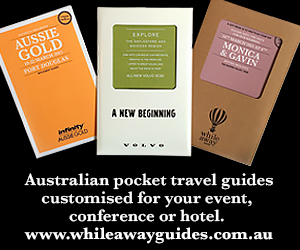In line with the zeitgeist, the City of Dreams integrated resort in the Philippines capital is demonstrating how a big, visible commitment to sustainability can help boost the bottom line.
The 6.2-hectare complex, set three kilometres from Manila’s airport and owned by Melco Resorts and Entertainment, is home to three luxury hotels, a giant casino, meetings and delegate-entertaining facilities, a shopping precinct and a range of classy restaurants. Throughout these operations, “sustainability is a really big commitment” says Charisse Chuidian (below, left), Vice President Public Relations for the complex.
With business ramping up here after the Philippines’ pandemic-induced paralysis, what does that mean in practice? And what can others emulate?
Phasing out plastic
A whole suite of initiatives are in place, explains Charisse, a well-known public-relations operator in the Philippines who’s been in her current role for eight years.
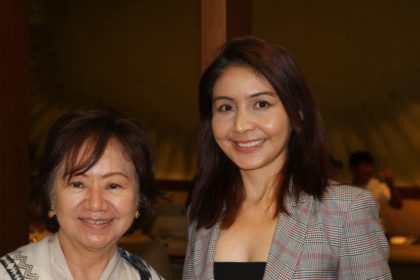 For a start it involves addressing one of the most troublesome pollution issues of our time – the use of plastics and plastic bottles. The City of Dreams is phasing the bottles out and replacing them and single-use plastic packaging with other eco-friendly options.
For a start it involves addressing one of the most troublesome pollution issues of our time – the use of plastics and plastic bottles. The City of Dreams is phasing the bottles out and replacing them and single-use plastic packaging with other eco-friendly options.
“We’re replacing non-biodegradable materials with alternatives like bagasse packaging for take-away boxes, paper pouches and cardboard boxes instead of acetate boxes for chocolates, and greaseproof paper for sandwiches,” says Charisse’s colleague Romina Gervacio (pictured with Charisse), Director of Public Relations.
Single-use plastic bottles in all gaming areas have already been eliminated, and small toiletry amenity bottles in the rooms of all three luxury hotels (Nüwa, Nobu and Hyatt Regency) have been replaced with reusable and refillable pump bottles. As The Siteseer discovered during a recent visit to the onsite Hyatt Regency, this represents no hardship, and we wondered why more hotel operators haven’t taken the same steps sooner.
Water recycling on site
To bolster this and other initiatives, the resort has installed an onsite water filtration plant and bottling system, which is expected to save the equivalent of more than four million single-use plastic bottles of fresh water per year. It also now recycles wastewater, with treated greywater being reused in the property’s cooling towers, saving in this way an estimated 88 Olympic-sized pools of water a year.
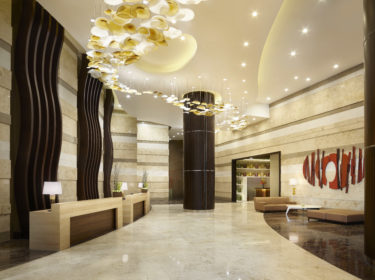 “We have our own herb garden on site as well,” Romina says. “And we brew and roast our own coffee purchased directly from local growers.”
“We have our own herb garden on site as well,” Romina says. “And we brew and roast our own coffee purchased directly from local growers.”
City of Dreams is touted to be the first integrated resort to have installed solar power. The panels produce 1.2MWh at full capacity, able to charge around 139 million cellphones in a year, they say.
Eighty-eight percent of its food and drink supplies are sourced from small to medium-size local businesses and it uses, for example, only sustainable seafood and cage-free eggs.
The company’s sustainability strategy is led by Melco Resorts CEO Lawrence Ho, who has outlined ambitious sustainability goals for the group’s properties, including carbon-neutral and zero-waste operations by 2030. City of Dreams Manila and its Property President Geoff Andres been already been widely recognised for this work, with the 2022-2024 ASEAN Green Hotel Award having been presented to the trio of hotels on the property.
Employee welfare a priority
The City of Dreams’ commitment to sustainability extends to the way in which it treats its three thousand-plus employees. Management offers workers 24/7 buffet and unlimited meals in an employees’ dining room, sleeping lounges and bathroom facilities, free shuttle-bus services at pick-up and drop-off points, and generous discounts in the hotels and restaurants. It enrols qualified managers in eCornell courses free of charge, offers skills training and more.
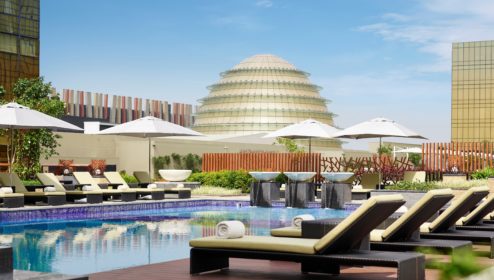 During the pandemic the company gave financial assistance via paid leave to those unable to work. “We also provided in-house accommodation for those who needed to be onsite, and free vaccinations for employees and family members. The staff vaccination rate is 99.9 percent, and only vaccinated people are rostered. (The Forbes Travel Guide announced in April that the property had won the 2022 “Work Here, Work Happy” accolade.)
During the pandemic the company gave financial assistance via paid leave to those unable to work. “We also provided in-house accommodation for those who needed to be onsite, and free vaccinations for employees and family members. The staff vaccination rate is 99.9 percent, and only vaccinated people are rostered. (The Forbes Travel Guide announced in April that the property had won the 2022 “Work Here, Work Happy” accolade.)
Unsurprisingly, like all hospitality businesses around the world, this one was devastated by the pandemic. According to one source, covid caused the Philippines’ economy to decline to its lowest level since World War II, with GDP decreasing by 9.5% in 2020, the worst drop since records began in 1947.
All the hotels and casino at the City of Dreams Manila were closed from March till May in 2020 with no dine-in business. Happily, things have since turned around since then, and new restaurants have opened in its shopping precinct, helping entice customers back.
The eateries include Italian, Thai and Korean outlets and a popular local café which complement others in the shopping boulevard, like the sensational “Red Ginger,” which specialises in a variety of Asian fare.
Occupancies up
Hotel occupancies are good again, Charisse says, with business mostly accounted for by local guests. The local MICE business on site hasn’t been far behind.
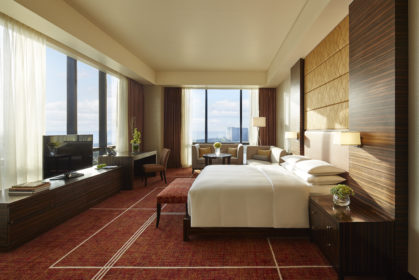 “Our family entertainment area DreamPlay [a 5,000 square-metre facility that offers a variety of activities] is up and running again. [It’s] not only for children but also used for team-building exercises,” she adds. In fact some meeting organisers have used it recently.
“Our family entertainment area DreamPlay [a 5,000 square-metre facility that offers a variety of activities] is up and running again. [It’s] not only for children but also used for team-building exercises,” she adds. In fact some meeting organisers have used it recently.
The CoD’s onsite ballroom can cater for up to 700 seated and is supported by a generous-sized pre-function area, two fully equipped board rooms with a capacity to seat 24, and a banqueting kitchen equipped for Filipino, Chinese, and Western fare.
From around AUD350 a day
What does it cost to stay here? A Club Deluxe Room (pictured above) with Hyatt Lounge access that includes breakfast and cocktails kicks in at around AUD360 a day. Prices on the Internet for room-only at the Hyatt Regency at time of writing were around AUD310 per night.
For inquiries and reservations, call 632 8800 8080 or e-mail guestservices@cod-manila.com.
For more information, visit www.cityofdreamsmanila.com.

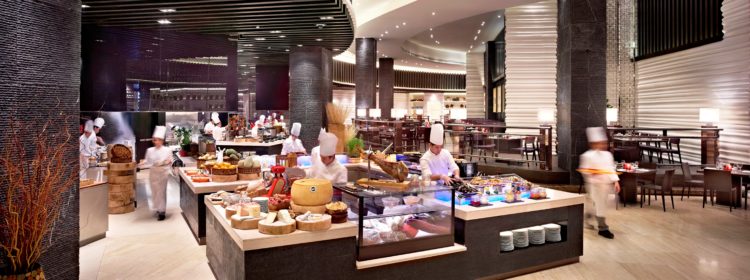

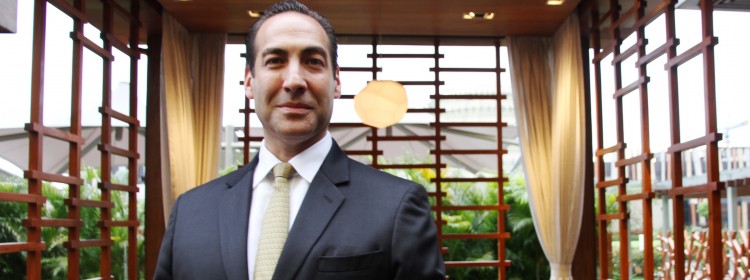

 We have the F&B, the entertainment and DreamPlay [pictured left and below, a family play space with attractions also suited to teambuilding activities] which is a first in the world. Couple that with the service we provide. In my opinion, and of course I’m biased, it’s a no-brainer. Why not come here?
We have the F&B, the entertainment and DreamPlay [pictured left and below, a family play space with attractions also suited to teambuilding activities] which is a first in the world. Couple that with the service we provide. In my opinion, and of course I’m biased, it’s a no-brainer. Why not come here?
 I’m proud of my luxury hotel experience which covers the gamut of line staff positions – security, night manager, housekeeping, guest services. We’re all professionals. A house keeper is not a maid; he or she is someone who provides a professional service.
I’m proud of my luxury hotel experience which covers the gamut of line staff positions – security, night manager, housekeeping, guest services. We’re all professionals. A house keeper is not a maid; he or she is someone who provides a professional service.
